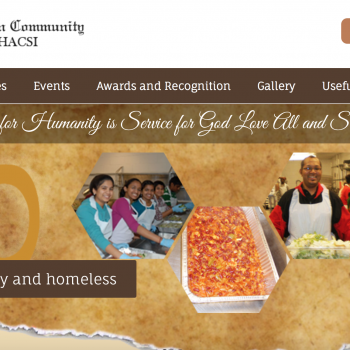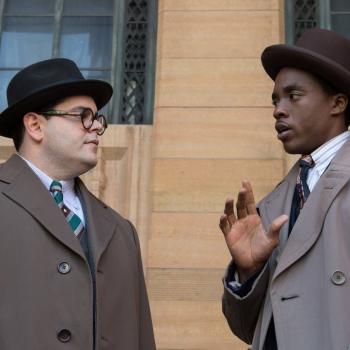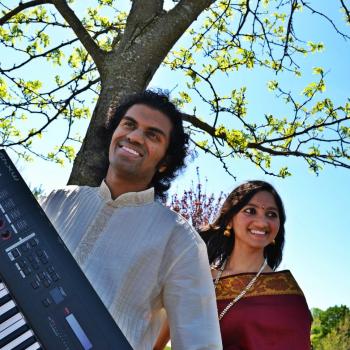The Hindu community stands in solidarity with their fellow Dharmic faith communities, especially the Sikhs.
The latest gun tragedy, the shooting in the gurdwara, is something I am compelled to write about as an advocate of interreligious understanding and a peace activist. But it is my heart that cries at the ignorance, and perhaps insanity or stupidity, that creates room for such terrible happenings. The loss of lives of other members of my ethnic and Dharmic faith communities is especially poignant because my interfaith journey was triggered by another incident of violence against a Sikh in the wake of 9/11. I know that I have a long way to go to come to peace with myself and a world where such calamities can occur.
Balbir Singh Sodhi, a Sikh mistaken for a Muslim, was murdered, supposedly in retaliation for the attacks of September 11, 2001. In 2002, a former city council and school board member from the city of Troy where I live, helped establish the Ethnic Issues Advisory Board. I joined this organization, helping to create its primary goals of “promoting education and multicultural exchange in an effort to achieve the enrichment of harmonious relationships and open communication within the City of Troy’s diverse ethnic community.”
As the EIA’s representative, I helped organize the annual Faith Community Prayer Breakfast(s), an initiative of the Troy Community Coalition to showcase the importance of faith in preventing drug and alcohol abuse. Here, I met the organizer of the city-sponsored annual National Day of Prayer event—and was refused a seat at the table at the city’s 10th annual event to celebrate this day in May 2005. At the time, I reached out to a childhood friend, Deepak Sharma, who was by then a religious studies professor at Case Western University. But it was advice and backing from several new friends that helped me become an advocate for interfaith and my faith: Rev. Rich Peacock, a now-retired United Methodist pastor; Steve Spreitzer, then-Director of Interfaith programs at the organization now known as Michigan Roundtable; and Suhag Shukla, now Managing Director of the Hindu American Foundation.
Fast forward to August 2012: Professor Sharma issues a call to action on the shooting in Wisconsin, in the Huffington Post:
While this tragic event again demands that Americans confront issues pertaining to gun control, it also demands that we confront issues about who are the easy targets and why they are perceived that way. Though we do not know (yet) if this was a hate crime or if it was the insane, irrational act of a deranged person, we must ask why, of all people and communities, were Sikhs targeted.
A few paragraphs later, he explains how he tells his wife to “be careful . . . Who knows if Indians will be easy target for others now?“—referring to the Indian-American ethnic community that I am also a part of.
A cautious retreat into the cocoon of one’s ethnic community is exemplified by what happened to Vincent Chin’s mother. I learned about this horrific crime that occurred decades before I arrived in Michigan: a baseball bat beating death of 27-year old Vincent Chin, a Chinese American. The American Citizens for Justice, a non-profit civil rights organization, began in the early ’80s because of the ensuing civil rights case brought against his killers. Chin’s mother, after disappointment that the killers were not brought to justice, returned to China. ACJ, however, continues to do the work of advocacy, and issued a statement, as many organizations are doing at a time like this, expressing
deep sadness on the tragic killings at the Sikh Temple in Oak park, Wisconsin . . . condemning the violence at the Sikh place of worship which left 7 dead including the priest and at least 3 wounded critically; extending our deepest sympathy to the victims, the Sikh community, the law enforcement personnel, and the friends and families of all affected.
Friends from different faith communities have also reached out, individuals like Brenda Rosenberg, founder of the Pathways to Peace Foundation, or Rev. Bob Hart, the Ecumenical and Interfaith Officer of the Episcopal Diocese of Michigan. The Diocese’s formal statement includes prayers “for the congregation at the Sikh Temple of Wisconsin, their families and friends and the entire Sikh community, offers of support and solidarity with the Sikhs living and worshiping in our own communities . . .”
And we at the Hindu American Foundation, where I am now an Executive Council member, were also ready with words of solace, wanting to “join all Americans in shared shock, disbelief, and outrage over today’s tragic events that unfolded at the holy gurdwara, or Sikh temple, near Milwaukee, Wisconsin earlier today. At least six Sikh Americans are dead, several are injured, including a valiant police officer who killed the assailant, and we face another day of catastrophe that is as outrageous as numbingly familiar.”
HAF also issued a call to action “to join Sikhs in mourning a senseless attack and to take this opportunity to not only learn about the sublime teachings of Sikh gurus, the Sikh faith, and the meanings of its external symbols, but also join hands to ensure that the gurdwaras remain sanctuaries of joyous worship and celebrated sharing of langar, or community meals, for generations to come.” We are all concerned that this may have been an act of religious intolerance or xenophobia, and seek to stand united and encourage understanding. My journey to faith and interfaith continues, as long as it takes, with friends at my side. As we sing every year (in many languages) at Troy’s annual interfaith event for the National Day of Prayer, “We shall overcome . . .”











